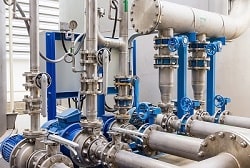Posted on 13th Jun 2025

In today’s energy-conscious world, pumping systems are at the forefront of industrial operations—from water treatment and irrigation to HVAC and manufacturing. However, traditional control methods often lead to energy wastage, excessive wear, and operational inefficiencies.
Enter Darwin Motion Variable Frequency Drives (VFDs)—intelligent motor control solutions designed to introduce adaptive control into pumping systems. By dynamically adjusting motor speed based on real-time system demands, Darwin Motion VFDs enhance performance, save energy, and prolong system lifespan.
Adaptive control is a feedback-based control technique that automatically adjusts system parameters in response to changing load conditions, pressure requirements, and flow rates. Unlike fixed-speed operations, adaptive control ensures the pump operates only as much as needed, reducing unnecessary power consumption.
Darwin Motion VFDs are engineered to:
Monitor pressure, flow, and load conditions
Adjust pump motor speed in real time
Reduce pressure surges and flow inconsistencies
Minimize energy usage during off-peak demand
With features like:
PID (Proportional-Integral-Derivative) control
Real-time feedback loop integration
Custom acceleration/deceleration ramps
Energy-saving sleep/wake modes
They are ideal for implementing adaptive control in pumping systems.
A typical Darwin Motion VFD-driven pump setup includes:
Pressure or flow sensor connected to the feedback input of the VFD
Pump motor connected to the VFD output (U, V, W)
VFD configured with PID control to maintain target setpoint (pressure/flow)
Digital/analog input signals for remote control or automation integration
| Feature | Benefit |
|---|---|
| Real-time speed adjustment | Optimizes energy usage based on system demand |
| PID tuning capability | Maintains stable pressure and flow without overshooting |
| Soft start/stop | Reduces mechanical stress and extends pump life |
| Sleep mode during low demand | Prevents unnecessary operation and wear |
| Fault diagnostics & alarms | Ensures system reliability and easy maintenance |
In a municipal water distribution system:
Setpoint: Maintain constant 3.5 bar water pressure
Input: Pressure sensor feeds real-time data to VFD
Action: Darwin Motion VFD adjusts motor RPM to maintain pressure
Outcome: Pressure remains stable despite fluctuating demand; energy consumption is reduced by up to 40%
By implementing adaptive control through Darwin Motion VFDs, industries and municipalities can:
Reduce their carbon footprint
Extend the lifespan of pumping infrastructure
Achieve significant cost savings on electricity bills
The integration of an adaptive control strategy using Darwin Motion Variable Frequency Drives transforms traditional pumping systems into intelligent, energy-efficient, and responsive units. Whether it’s for water treatment, irrigation, or industrial use, this smart solution helps maximize performance while minimizing cost and waste.